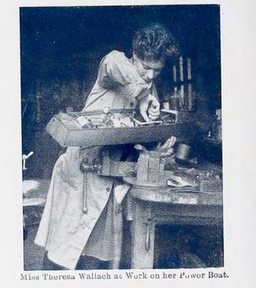 Engineer of the Week No. 37 Theresa Elizabeth Wallach (30 April 1909 - 30 April 1999) On her 110th birthday we remember Theresa Wallach, engineer, motorcycle racer, adventurer and author. Theresa Wallach was a woman engineer who not only was a pioneer in the sense of being one of those who took up such work when it was rare for a woman but also in her adventurous expeditions in Africa and America, which would have been just as pioneering for any man at the time. Born in 1909 into a middle class family in the south of England, her German-born father was initially a stockbroker and then a gentleman-farmer. Apparently enamoured of motorbikes from a very early age, Theresa was too young to get her start in engineering during the First World War but at the age of 20 was working for British Thomson-Houston, the engineering and heavy industrial company, which was at that point part of the Vickers empire. She seems to have been an apprentice as she was also taking courses at the Northampton Polytechnic. In 1932 she went to join Kathleen Cook’s Hercules Engineering Company in Isleworth. In 1935 she and Florence Blenkiron set off on their headline-grabbing 8-month trip from London, via the Sahara desert, to Cape Town by motorbike.
0 Comments
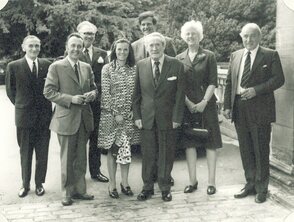 Group picture with Molly at the back, is of the partners on the occasion of the firm’s 125th anniversary. Group picture with Molly at the back, is of the partners on the occasion of the firm’s 125th anniversary. Engineer of the Week No36: Mary (Molly) Isolen Fergusson OBE, BSc, DSc, MICE, MConsE.(28th April 1914 - 30th November 1997) Today we remember Scotland’s first woman to become a career civil engineer, Molly Fergusson, on her 105th birthday. Molly Fergusson was the eldest daughter of a Scottish medical father whose own fascination with invention surrounded her childhood, as he made a lot of his own equipment for his research in the early days of radiography. She attended York College for Girls, a small independent church school where she became head girl and was encouraged in her interest in engineering. She graduated with a BSc Hons in Civil Engineering from the University of Edinburgh in 1936, and remained living in Edinburgh for the rest of her working life. Engineer of the Week No.35: Miss Mary Evelyn ‘Evi’ Roxburgh (10th October 1896 - 24th April 1973)
Today we remember Evelyn Roxburgh, on the 46th anniversary of her death. Scotswoman Evelyn Roxburgh is thought to have been the first woman to qualify as an electrical engineer in Scotland. Born in Edinburgh in 1896 into a family of lawyers, she gained her Diploma in Electrical Engineering, from Heriot-Watt College, Edinburgh, in 1923, when the only other women studying engineering in Scotland seem to have been doing civil engineering. She then got a job in the electrical switchgear department of Metropolitan Vickers, presumably in Birmingham. Metro-Vicks as it was known, was one of the biggest engineering companies in the country and also the foremost employer of women engineers in the interwar period when such work was extremely difficult to find for women, regardless of their experience or qualifications. 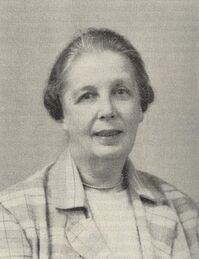 Engineer of the Week No.34: Margaret Mary Partridge BSc, MIEE (18th April 1891 - 27th October 1967) On her 128th birthday we remember Margaret Partridge, electrical power supply pioneer and campaigner for women’s right to work at night. Margaret Partridge was born in Nymet Rowland, Devon in 1891 to John Leonard James Partridge (1859–1922), a landowner of independent means, and Eleanor Parkhouse Joyce (1858–1926). The family moved to Bedford where Margaret attended the High School, and went on to Bedford College, London, on two scholarships. She graduated with a BSc Honours in maths in 1914. Her first job was as assistant mistress at Saltburn High School but soon moved to be an assistant to an eminent heating engineer, Arthur Henry Barker, in London. 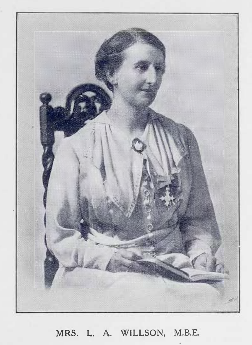 Engineer of the Week No.33: Laura Annie Willson (nee Buckley)MBE (15th August 1877-17th April 1942) Today we remember Laura Willson, trades union activist, engineer and housebuilder, on the 77th anniversary of her death. She was also a Founder of the Women's Engineering Society. Laura Annie Willson was a Yorkshirewoman to her boots and lived and worked in Halifax most of her life. Born in 1877 to a working class labourer, Charles Buckley, she and her sisters were all sent to work half-time in the textile mills from the age of 10, only getting a very basic education in the afternoons, as was normal for poor families then. At the age of 22, a worsted weaver, she married George Henry Willson who was a machine tool maker. Together they established, Smith, Barker and Willson,a successful engineering works in Halifax and she would become one of its directors. She was a member of the Women’s Labour League and the Women’s Social and Political Union and in 1907 was arrested twice and imprisoned for her partin a weavers’ strike on a charge of ‘violent and inflammatory speech’. During the Great War the family’s company works expanded and she organised all the women munitions workers they had to take on, including setting up a canteen when she realised how many of them were malnourished. She was one of the first women to receive an MBE, in 1917, for her war work. In the 1920s she became interested in the application of industrial efficiency ideas to housebuilding for ordinary workers, and in 1925 became the first woman member of the Federation of House Builders. She built several low cost housing estates in the Halifax area, and later Surrey. She was also active locally in founding and supporting networking organisations for businesswomen, becoming the first President of Soroptimists International’s Halifax branch in 1928. She was a founding member of the Women’s Engineering Society in 1919, member of its first council and co-founder of the Electrical Association for Women in 1924. In 1926-28 she was the president of WES and remained active almost until her death in 1942. Engineer of the Week No.32, Frances Dora Heywood BSc, PhD, MInstMet (nee Weaver) (14th April 1902 - 18th September 1994)
Today we remember metallurgist Frances Heywood on her 117th birthday. Frances Weaver was the fourth daughter of an itinerant Methodist preacher, and was a Methodist her whole life. Although born in northwest London, the family followed her father’s work and she was educated in Yorkshire: at Bradford Girls Grammar School and Sheffield High School. She was then awarded an Arnott Scholarship to study at Bedford College, University of London in 1920 from which she graduated in 1924 with a first class honours degree in chemistry. She then worked as Assistant Metallurgist to the Lanston Monotype Corporation Ltd, at Harley, Surrey, where her work put her in charge of the hardening and plating workshops. The firm was a very large one, employing a thousand men to make the type on which printing then depended. Coming straight from university she had a lot to learn on the practical side and was able to befriend the foreman who taught her a lot of what she needed to know and enabled her to quietly ask the company’s fitters to help her maintain the motorbike on which she commuted to work. Engineer of the Week No.31: Winifred Joyce "Winnie" Drinkwater (11th April 1913 - 6th October 1996)
Today we remember Scottish aviator and engineer, Winnie Drinkwater on her 106th birthday. Scotswoman Winnie Drinkwater was a very well-known pilot and engineer in the 1930s. She was born in the rural village of Waterfoot to the south of Glasgow, her father was a mechanical engineer. Her father Albert was born in Italy with an Italian mother, and her mother Emma Banner, a district nurse, was the daughter of a Glasgow art teacher. In June 1930, at the earliest possible age of 17 she joined the Scottish Flying Club near Renfrew and over the next 2 years took part in Air Pageants and races, winning cups even before she was old enough to hold her full licence. On 8th May 1932, aged 19, she gained her pilots licence, her "B" (Commercial) licence on 14th May 1932, and her instructors licence later that year. This made her in quick succession the youngest pilot in the country and then the youngest ever UK commercial pilot. 1932 continued as an exciting year with various other public flying events including, in September, winning the Scottish Flying Club trophy for landing and in October,one of the Club's cups for air racing, winning by just 2 seconds over a course of 15 mile. 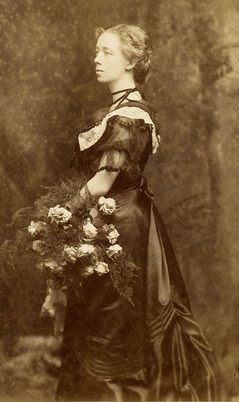 Engineer of the Week No.30 Adelaide Anderson. Today we remember Factory Inspector Dame Adelaide Mary Anderson, DBE (8th April 1863 - 28th August 1936), on her 156th birthday. Although not an engineer by training and not the very first of the Lady Factory Inspectors, Dame Adelaide Anderson became one of the best known and had close connections with the Women’s Engineering Society at its outset in the final years of her own career. Although her principal role related to the working conditions, pay, hours etc of women and children, as the safety legislation grew so too did the Lady Factory Inspector’s need to understand the technicalities of the processes she was observing. Born in Australia to a Scottish family, Adelaide Anderson was educated in London at Queen's College in Harley Street and then at Girton College, Cambridge, where she studied for the Moral Sciences Tripos, graduating in 1887. Her first civil service job was in 1892, as a clerk in the Royal Commission on Labour as a clerk. By 1894 she had become one of theHome Office’s first female factory inspectors and was promoted to be one of His Majesty's Principal Lady Inspector of Factories in 1897, dealing with issues of health and safety, working hours and conditions. 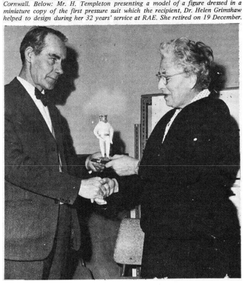 Engineer of the Week No. 29: Today we remember aeronautical engineer and pioneer g-force-pressure suit designer, Helen Grimshaw Helen Grimshaw, OBE, BSc, PhD(6th August 1904 - 16th December 1987) Helen Grimshaw was born in London but her upbringing was in Surrey. Her father was a civil engineer working for one of the electrical supply companies and presumably fairly prosperous as the family had 3 servants during her childhood and she was educated at a private girls’ school in London, the Frances Holland School. In 1924 she became an engineering student at the University of London and applied for student membership of the Institution of Civil Engineers, becoming one of their associate members the following year. She graduated from UCL in 1930 with a BSc (Special) Engineering and re-entered to spend the following year doing practical training in the engineering workshops. 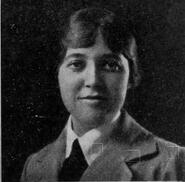 Engineer of the Week No.28. Today we remember American mechanical engineer, Ethel H. Bailey Ethel Bailey was an American mechanical engineer working from about 1917 to some time in the 1950s. As well as her active membership of the Women’s Engineering Society (WES was the only such society worldwide during most of her working life) she is understood to have been one of the first women to be admitted as a full member of the American Society of Automotive Engineers (SAE) and was also a member of the American Society of Mechanical Engineers, the Society of American Military Engineers, and the National Society of Professional Engineers. |
- Home
- Electric Dreams
- All Electric House, Bristol
- Top 100 Women
- Engineer of the Week
- The Women
- Timeline
- WES History
- EAW
- Teatowels For Sale
- 50 Women in Engineering
- Museum Trails
- Waterloo Bridge
- History Links
- Blue Plaques
- Virtual Blue Plaques
- Career and Inspiration Links
- Contact
- Outreach
- Photo Gallery
- Bluestockings and Ladders
